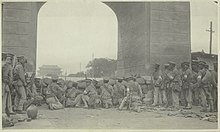Manchu Restoration
| Manchu Restoration | |||||||
|---|---|---|---|---|---|---|---|
 Republican troops fighting to retake the Forbidden City on July 12, 1917, after Zhang Xun’s attempted imperial restoration |
|||||||
|
|||||||
| Belligerents | |||||||
|
|
|
||||||
| Commanders and leaders | |||||||
|
|
|
||||||
The Manchu Restoration of July 1917 was an attempt to restore monarchy in China by General Zhang Xun, whose army seized Beijing and briefly reinstalled the last emperor of the Qing dynasty, Puyi, to the throne. The restoration lasted only a few days, from July 1 to July 12, and was quickly reversed by republican troops.
The confrontation between President Li Yuanhong and Premier Duan Qirui about whether to join the Allies in World War I and declare war on Germany led to political unrest in the capital Beijing in the spring of 1917.
The military governors left Beijing after Duan Qirui's dismissal as Premier. They gathered in Tianjin, calling on the troops from the provinces to rebel against Li and take the capital, despite the opposition of the navy and the southern provinces. In response, on June 7, 1917, Li requested that General Zhang Xun mediate. General Zhang demanded that parliament be dissolved, which Li considered unconstitutional.
On the morning of July 1, 1917, the royalist general Zhang Xun took advantage of the unrest and entered the capital, proclaiming the restoration of Puyi at 4 am with a small entourage and reviving the Qing monarchy which had been abandoned earlier on February 12, 1912. The capital police soon submitted to the new government. General Xu later published an edict of restoration that falsified the approval of the president of the republic, Li Yuanhong. He was also supported by several other officials, including Beiyang General Jiang Chaozong, former Qing war minister Wang Shizhen, civil affairs minister Zhu Jiabao, and diplomat Xie Jieshi.
Over the next 48 hours, edicts were proclaimed in an attempt to shore up the restoration, to the astonishment of the general public. On July 3, Li fled the presidential palace with two of his aides and took refuge in the embassy district, first in French legation and later in the Japanese embassy.
...
Wikipedia
